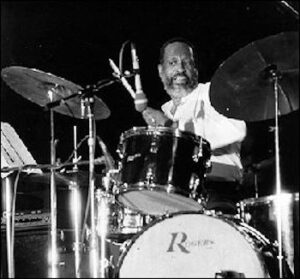
Steve McCall
*Steve McCall was born on this date in 1933. He was a Black jazz drummer.
McCall was born in Chicago, Illinois. As a young child, he "experienced a musical epiphany" when he played a drum in Chicago's annual Bud Billiken Parade. As a teenager, McCall attended Englewood High School in Chicago and studied music theory, Latin percussion, and classical percussion.
After high school, he joined the U.S. Air Force and returned to Chicago in 1954, where he took a job in the airline industry. McCall bought his first drum set and began using free air travel passes to study with drummer Charles "Specs" Wright in Philadelphia. He also began freelancing, playing with Lucky Carmichael, Booker Ervin, Charles Stepney, Gene Shaw, and Ramsey Lewis.
In 1961, McCall and pianist Muhal Richard Abrams began playing with Abrams' Experimental Band, which brought him into contact with like-minded Chicago-based musicians. McCall became one of the Association for the Advancement of Creative Musicians founders, established in 1965, initially serving as treasurer. In 1967, McCall moved to Amsterdam, the first AACM member to visit Europe, and played with expatriates such as Don Byas and Dexter Gordon.
In 1968, he began playing in a group led by Marion Brown. McCall would go on to record five albums with Brown. That year, McCall moved to Paris and joined an existing group whose members were Anthony Braxton, Leo Smith, and Leroy Jenkins. During his stay in Paris, McCall served as a link between the first generation of European free jazz musicians and members of the AACM. Notable albums recorded during this time included Hampel's 1969 and Gittin' to Know Y'All. In 1970, McCall moved back to Chicago, and he and others formed a group known as the Creative Construction Company.
The group performed a recording of a two-volume concert at the Peace Church in New York City. That summer, McCall also recorded the album The Chase! with Dexter Gordon and Gene Ammons. He returned from Europe in 1975, moving to New York City and reuniting with Threadgill and Hopkins. The trio, now called Air, would record eleven albums, with McCall participating in all but the last two. In the mid-1980s, he joined Cecil Taylor's group, recording Olu Iwa, and worked with Roscoe Mitchell, recording The Flow of Things. McCall died on May 24, 1989, at South Shore Hospital in Chicago.
Writer Gary Giddins of the Village Voice called McCall "an immensely likable man whose work with Air was a benchmark of the '70s." John Litweiler wrote that McCall's "sensitivity to subtle gradations of sound textures... put him in wide demand as an accompanist; uniquely in jazz, he was a drummer who conveyed emotional subtlety." Henry Threadgill recalled: "Steve plays so unorthodox, the way he used to handle space, he would free me, so I'd have several levels to play on."
In 1992, Roscoe Mitchell recorded a tribute album, This Dance Is for Steve McCall. In 2015, the Artifacts Trio (Nicole Mitchell, Tomeka Reid, and Mike Reed) included two of McCall's compositions on their album Artifacts to celebrate the AACM's legacy.